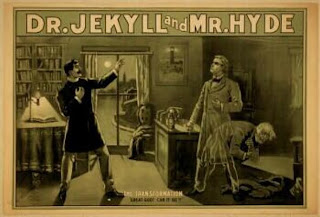And yet, for all of that, I think that my entire life I have misunderstood one of the most crucial ideas of the story. See, I had always considered Jekyll to be as much a saint as Hyde was a sinner. That is, I thought the personalities to be a perfect duality - the one being everything the other was not. The potion Jekyll drank simply took the two parts of his moral makeup and split them into two separate beings.
But such, at least according to Stevenson's tale, was not the case*. As Jekyll indicates when laying down his history:
Had I approached my discovery in a more noble spirit, had I risked the experiment while under the empire of generous or pious aspirations, all must have been otherwise, and from these agonies of death and birth, I had come forth an angel instead of a fiend. The drug had no discriminating action; it was neither diabolical nor divine; it but shook the doors of the prisonhouse of my disposition; and like the captives of Philippi, that which stood within ran forth. At that time my virtue slumbered; my evil, kept awake by ambition, was alert and swift to seize the occasion; and the thing that was projected was Edward Hyde. Hence, although I had now two characters as well as two appearances, one was wholly evil, and the other was still the old Henry Jekyll, that incongruous compound of whose reformation and improvement I had already learned to despair. The movement was thus wholly toward the worse.
This fact - the idea that Jekyll remained Jekyll (imperfections and all) even after the transformation - may be the reason that Hyde was able to take control over Jekyll in the end.
Had Jekyll been the saint I imagined (the perfect side of Jekyll's better nature), Hyde would have likely soon lost power over him. (After all, Perfect Jekyll likely would have ceased using the potion because, as a saint, he would have not had any desire to give vent to dark longings he no longer had). Instead, however, Jekyll remained frail - as are we all - and each transformation provided meat for the dark half of his humanity to eat as he continued to allow himself to be drawn further into Hyde's sinister world. And so Hyde grew in power until he was able to force Jekyll to change without the potion catalyst.
The growth of Hyde's power in the tale reminds me of an idea I've heard at various times throughout my life. The idea is simply that in each person, there are two animals fighting for control over the person: One is good, the other evil. The question is, which animal will win? The answer follows the reasoning in Jekyll's record: Whichever one that person chooses to feed. If we want to escape the Hyde in each of us (and there is Hyde in each of us ... whether we like to admit it or not), we must cease to give vent to the emotions and ideas that provide that side of our natures with strength and nourishment.
The other idea I want to explore (in a subsequent post perhaps) is the role of Utterson in the tale. I am, as you might expect, always fascinated by literary tales of lawyers. The very first sentence nearly made me laugh out loud:
I am, as always, anxious to hear your thoughts.
The other idea I want to explore (in a subsequent post perhaps) is the role of Utterson in the tale. I am, as you might expect, always fascinated by literary tales of lawyers. The very first sentence nearly made me laugh out loud:
Mr. Utterson the lawyer was a man of a rugged countenance that was never lighted by a smile; cold, scanty and embarrassed in discourse; backward in sentiment; lean, long, dusty, dreary and yet somehow lovable.In some ways, the story is as much about Utterson as it is about Hyde or Jekyll. But why does Stevenson use him? What does he add (or take away ... Stevenson did want to keep his readers in the dark until the final reveal, I do believe) from the story?
I am, as always, anxious to hear your thoughts.
Now, before leaving this post, I wanted to republish some questions about the book that Shandy asked back in October. She wrote:
"The right to search for truth implies also a duty; one must not conceal any part of what one has recognized to be true." How does this apply to Jekyll and Hyde? Utterson? Dr Lanyon? In his final explanation, Dr Jekyll divided his intelligence into moral intelligence and intellectual intelligence. Fascinating division, but was it enough to rationalize what Hyde did?
Difficult issues. Weighty. In fact, I'm not sure I can begin to answer that for Jekyll/Hyde, much less Dr. Lanyon or Utterson. Can (or should) the pursuit of "knowledge" and "discovery" justify what Jekyll did? At least insofar as it caused him to continue to delve into the world of Hyde? I guess I would give Jekyll the benefit of the doubt for the first transformation; after all, at that point, he didn't know what would happen when he drank the potion.
But all the subsequent times?
Jekyll admits that his transformations continued after that first time not to pursue "truth," but in order for him to create an avenue for his own worst enemy to rise and act (seemingly) without any accompanying feelings of guilt or social disapproval.
And would Lanyon have pursued the experiment had he been the one to stumble across it? Probably not. It seems that the moment he realized such an experiment could lead to the release of a moral deviant, he would have ceased the search entirely.
But all the subsequent times?
Jekyll admits that his transformations continued after that first time not to pursue "truth," but in order for him to create an avenue for his own worst enemy to rise and act (seemingly) without any accompanying feelings of guilt or social disapproval.
And would Lanyon have pursued the experiment had he been the one to stumble across it? Probably not. It seems that the moment he realized such an experiment could lead to the release of a moral deviant, he would have ceased the search entirely.
Still, I may not be understanding the question properly ... I would be more than happy to recieve guidance on that.
Until my next post or comment, then, farewell. Good reading to you.
Until my next post or comment, then, farewell. Good reading to you.
* NOTE 1: I think that other incarnations of Jekyll and Hyde may have given rise to this misperception.


No comments:
Post a Comment